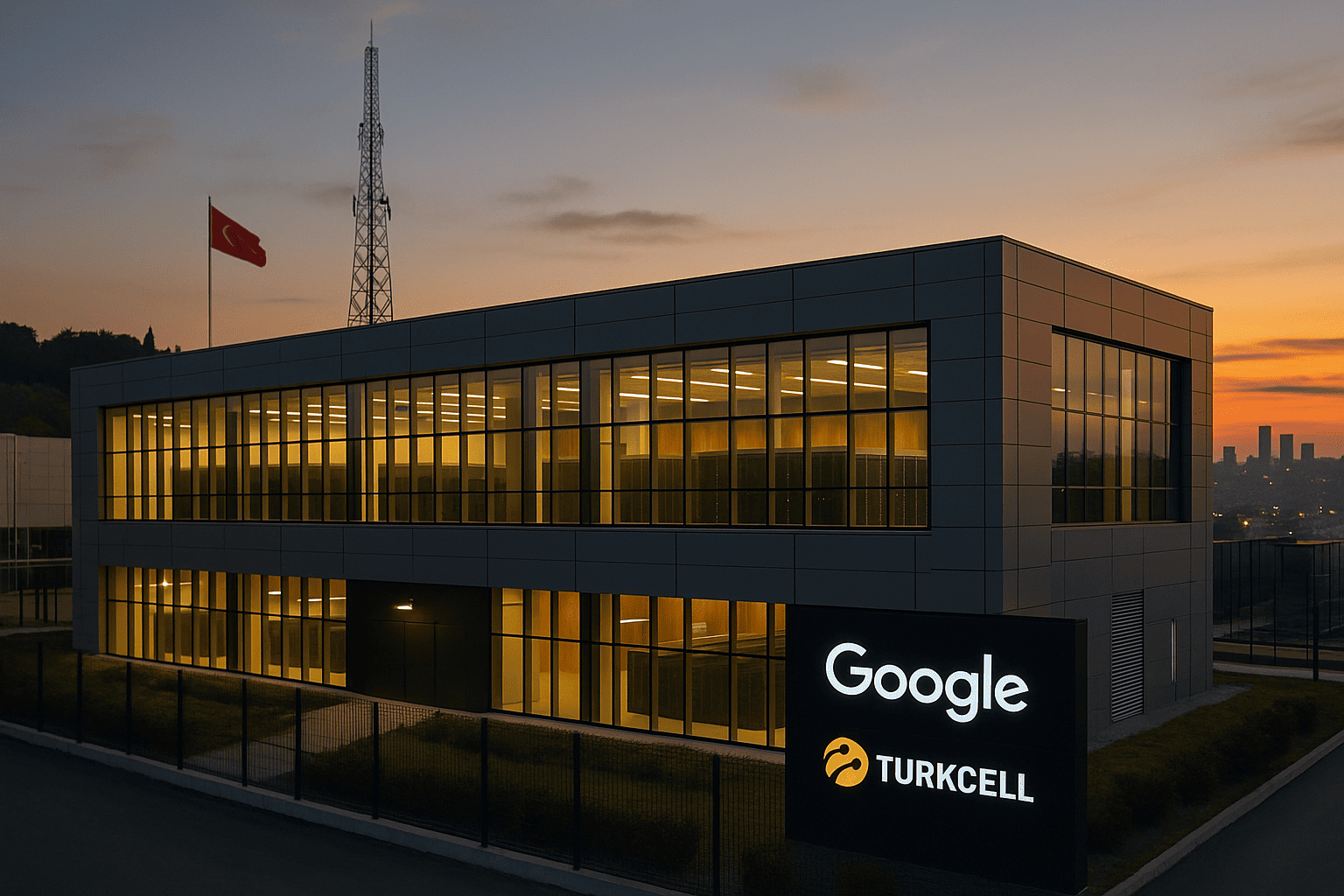Google’s $2B Turkey Data Center Plan with Turkcell
By Tredu.com • 11/20/2025
Tredu

Deal overview
Google’s $2B Turkey Data Center Plan with Turkcell signals a scaled commitment to serve regional enterprise and public-sector demand from inside Turkey. At its core, the initiative is a capacity and latency play, pairing Google’s cloud stack with Turkcell’s local network, data-center operations know-how, and channel relationships. Investors also described the project using a shorter tag, Google $2B Turkey Data Center with Turkcell, a phrase that captures the spending level, the host market, and the local partner in one line.
What Google and Turkcell are building
The project envisions a multi-building campus that can ramp in stages, with initial halls dedicated to general compute and storage, followed by expansions that support AI training and inference clusters as power and cooling are upgraded. Turkcell’s role spans site development, fiber backhaul, and integration with domestic enterprise networks. Google brings design standards, security controls, and the cloud services portfolio that tenants consume.
Why Turkey, why now
Turkey sits at a crossroads for Europe, the Middle East, and the Caucasus, which makes it a logical hub for latency-sensitive workloads spanning retail, gaming, financial services, and public digital services. Local hosting helps large customers meet data-residency rules, it improves application responsiveness for domestic users, and it reduces the risk of cross-border congestion. Ankara has been courting foreign direct investment in digital infrastructure, offering clearer zoning for hyperscale sites and faster permitting under strategic-investment designations.
Financing, incentives, and structure
The $2B headline points to a phased capital plan, not a single-year outlay. The first tranche typically covers land, grid interconnects, and core mechanical-electrical-plumbing systems, with later tranches tied to tenant demand and power availability. A joint program allows each party to finance what it does best, Google on the data-center stack and cloud, Turkcell on fiber, last-mile connectivity, and facilities operations. Local incentives could include accelerated depreciation, customs facilitation for specialized equipment, and workforce subsidies for technical training.
Timeline and capacity markers
Site work and utility buildouts usually take several quarters, so a realistic glide path is initial capacity in 2026–2027, with room to double or triple as demand proves out. Ramp speed depends on substation readiness, transformer deliveries, and water or alternative cooling approvals. Early halls are often provisioned for conventional cloud services, then refitted or extended with liquid or hybrid cooling as AI clusters arrive.
Energy, sustainability, and resilience
Power is the gating factor for next-generation data centers. Expect a mix of grid power, power-purchase agreements for renewables, and efficiency upgrades such as heat-reuse or advanced free-air cooling where climate allows. Turkcell’s nationwide footprint can help diversify interconnects and build fiber redundancy. For resilience, the design should include dual feeds, on-site fuel storage sized for multi-day autonomy, and rigorous testing of UPS and protection systems. Sustainability reporting will matter for multinational tenants that count location-based and market-based emissions.
What it means for customers
Domestic banks, payment firms, and e-commerce platforms gain lower-latency access to Google Cloud regions without routing sensitive traffic offshore. Media and gaming companies can serve peak events with fewer buffering risks. Public-sector agencies can modernize workloads while keeping records inside national borders, a recurring requirement in procurement. For global clients, the campus adds a regional node that shortens paths to Turkish users and creates a new availability zone for disaster recovery.
Competitive landscape
Global hyperscalers and regional providers are expanding across Central and Eastern Europe, the Levant, and the Gulf. A Google–Turkcell campus gives the pair a strong answer to rivals that already run in-country facilities or that lean on proximate hubs. Price competition is likely to be selective, focused on storage tiers and egress, while the decisive factor for many buyers will be latency and compliance. For Turkcell, the partnership deepens enterprise reach and diversifies beyond connectivity into higher-margin cloud services and managed solutions.
Labor market and supply chain effects
Construction phases support contractors across civil works, electrical, and HVAC. Once live, each hall needs technicians, network engineers, and facilities specialists. The multiplier extends to equipment vendors, modular-build manufacturers, and security providers. Training pipelines with universities and technical colleges can align around data-center operations, network automation, and cybersecurity, which in turn supports the broader digital economy.
Policy and regulatory watchpoints
Permits for large electrical loads, water usage, and traffic management can stretch timelines if documentation is incomplete. Data-protection rules will govern how foreign and domestic tenants store and process information. Export-control policies on high-end accelerators also matter for AI capacity; operators can stage around constraints by reserving general compute first, then adding specialized racks when licenses clear. Clear public communication on privacy, security, and environmental impact will reduce friction.
Market read-through
For equities, local infrastructure builders, engineering firms, and electrical-equipment suppliers stand to benefit as orders convert. Telecom operators and neutral-host data-center companies may see renewed interest in co-location and edge nodes that hang off a national hub. For cloud software vendors, a Turkish region can accelerate enterprise adoption by removing compliance objections. Over the medium term, the project can attract adjacent investments in content delivery, cybersecurity, and AI services, which compounds the initial FDI.
Risk ledger
Three variables could reshape the trajectory: power availability, potential construction bottlenecks, and currency volatility. If substation work or transformer deliveries slip, capacity ramps slide, which would defer revenue. If macro conditions tighten, procurement cycles could lengthen, particularly for discretionary workloads. These risks are manageable with staged capex, diversified suppliers, and contracts that align expansion to booked demand.
Bottom line
Google $2B Turkey Data Center with Turkcell encapsulates the strategy: put meaningful capacity inside Turkey, partner with a national champion, and scale in phases as demand, permits, and power line up. If execution tracks the plan, the campus should lift cloud adoption, create skilled jobs, and anchor a broader digital ecosystem that draws follow-on investment.

How to Trade Like a Pro
Unlock the secrets of professional trading with our comprehensive guide.


